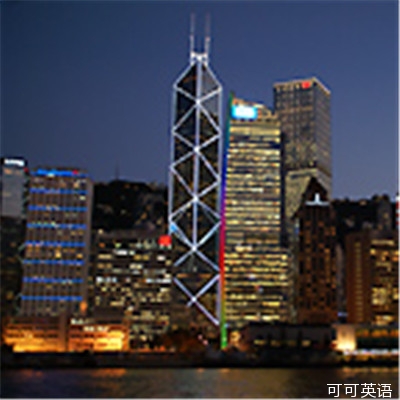(单词翻译:单击)

Hong Kong’s sheer tower blocks offer fabulous views of forested peaks and busy shipping channels to those who have the stomach to resist a touch of vertigo. But right now it is not just the physical height that will make your head spin.
对甘愿忍受轻微眩晕的人来说,在香港的摩天大楼上可以欣赏树木郁郁葱葱的山峰和船只川流不息的航道。但现在让人头晕的不只是大楼的物理高度。
Residential property prices are near record highs as the tiny island has been squeezed between Chinese money looking to escape the mainland and the ultra-loose monetary policies of the US Federal Reserve.
内地资金大量涌入香港,再加上美联储(Fed)的超宽松货币政策,推动香港住宅价格在历史高位附近徘徊。
For local banks facing the risks of a bubble bursting, the great saving grace is that there are quite strict limits on the loan-to-value ratios allowed for mortgage lending. Even with a heavy drop in prices – some are predicting up to 30 per cent falls this year – losses should be limited. However, in combination with rising interest rates and the ebbing of both the Chinese economy and US liquidity, small property price declines will be painful for the island’s most sophisticated banks.
对面临泡沫破裂风险的香港本土银行来说,幸运的是,在发放抵押贷款时,它们在贷款估值比率方面有着相当严格的限制。即便房价大幅下跌——有些人预计今年跌幅可能高达30%——银行的损失也应该有限。然而,伴随着利率上升、中国经济减速以及美国流动性减退的情况,房价即便小幅下跌,也会让香港最顶尖的银行感到痛苦。
The money flooding into Hong Kong, much of it from China, has been eye-popping in the past couple of years. Home prices are 20 per cent higher than the previous record set in 1997, just ahead of the Asian financial crisis, according to the Centaline Index, from the city’s largest estate agency.
过去两年里涌入香港的资金规模令人瞠目,其中大多来自中国内地。根据香港最大的房地产经纪机构中原地产代理有限公司(Centaline)编制的指数,香港现在的房价比1997年创下的上一个历史纪录还要高20%,当时正值亚洲金融危机爆发前夕。
Most apartments in Hong Kong cost between HK$10,000 (US$1,300) per sq ft and more than HK$30,000 – which in London, for example, is barely matched by the most exclusive inner-west areas of Kensington, Chelsea or Marylebone.
香港公寓价格普遍在每平方英尺1万港元(合1300美元)到3万港元,而在其他城市,比如伦敦,只有肯辛顿、切尔西、马里波恩这些最高档的内西区地段才有这么高的价格。
The flood of cash has come in other ways too. Sales of watches, jewellery and luxury gifts remain fabulous in spite of the crackdown on corruption in China. Almost one dollar out of every four spent in the city’s shops last year went on such things, hitting a total of $15.2bn, which was 25 per cent higher than the year before, according to government statistics.
资金洪流也通过其他方式涌入香港。尽管中国大力开展反腐运动,但香港手表、珠宝和高档礼品依然热卖。政府统计数据显示,去年在香港商店消费的每4美元当中,就有接近1美元是购买了此类商品,购买总额高达152亿美元,比上年增长25%。
Even the most ardent proponent of the “trickle down effect” would struggle to show how normal people had benefited in any way from this kind of spending, but it is unarguable that Chinese money has driven Hong Kong in many ways. On the flip side, though, the correlation between property price rises and the expansion of the Fed’s asset base shows the influence of US monetary policy – which is beginning to change course.
即便是“涓滴效应”理论的最忠实拥趸也很难证明,普通人如何受益于这种支出,但无可争辩的是,内地资金从许多方面影响着香港。另一方面,香港房价上涨与美联储资产基础扩张之间的关联显示出美国货币政策的影响,而后者开始转向。
Hong Kong faces similar issues to other small Asian economies. Rising interest rates and the slowing of the biggest economy in Asia spell an end to special conditions enjoyed over the past few years, which have pushed down default rates and losses to lenders to negligible levels. For southeast Asia, the rising cost of money and the growing scarcity of foreign money in capital markets is coming at the same time as current accounts have deteriorated and local banks have seen deposit funding shrivel. Companies and people have spent more and saved less. The risk is a whiplash effect on the cost and availability of credit, the ability of locals to service their loans and the losses banks will suffer as a result. The influence of Fed policy has pushed local interest rates lower than theyshould have been given economic fundamentals (the BIS reckons 1.5 percentage points lower on average across emerging markets), so the unwinding looks likely to send them much higher than they ought to be for local conditions.
香港面临着和其他亚洲小型经济体一样的问题。利率不断走高,加上亚洲最大经济体出现增长放缓,意味着过去几年特殊的资金宽松状况走到了尽头——宽松的资金状况降低了违约率,以致银行没有遭受多少损失。在东南亚地区,与资金成本上涨和外国资金退出资本市场相伴随的是,经常账户恶化以及本土银行的存款资金萎缩。企业和个人加大支出,减少储蓄。这就有可能对信贷成本及供应、还有本地贷款者的还贷能力产生“鞭梢效应”,从而导致银行遭受损失。在美联储政策影响下,这些地区的利率低于从经济基本面考虑应有的水平——国际清算银行(BIS)估计,平均而言,新兴市场利率比合理水平低1.5个百分点。因此,美联储退出刺激政策很可能导致这些地区的利率远高于与基本面相匹配的水平。
In Hong Kong, these problems are familiar. The HK Monetary Authority has reported that local deposits were shrinking and loan to deposit ratios rising in both local and foreign currencies. The authority has warned on the sharp increase in US dollar loans, especially to offshore, mostly Chinese borrowers. This borrower behaviour, predicated on higher interest rates inside China and an always appreciating renminbi, has been exposed now that the currency is changing direction.
香港对这些问题并不陌生。香港金融管理局(Hong Kong Monetary Authority)公布,本地存款萎缩,本外币业务的贷存比都在上升。香港金管局已经对美元贷款(尤其是主要流向内地借款者的离岸美元贷款)的急剧增长发出了警告。这种借款行为——基于内地利率较高和人民币此前一路升值——已经面临风险,因为人民币汇率走势正在转向。
For Hong Kong’s most sophisticated banks, however, there is an extra sting in the tail. Coinciding perfectly with the special conditions unleashed by US Fed policy, the HKMA allowed HSBC, its subsidiary Hang Seng Bank and Standard Chartered, to introduce advanced internal ratings-based capital measures in 2008.
然而,香港顶级银行还另有一个不妙的地方。与美联储政策造成的特殊资金状况完全同步的是,香港金管局在2008年允许汇丰(HSBC)及其旗下的恒生银行(Hang Seng Bank)以及渣打银行(Standard Chartered)在计算资本时采用“高级内部评级基准计算法”。
These let the banks hold less capital when asset values are high (particularly property) and credit performance is good. This is highly pro-cyclical. Analysts at Morgan Stanley believe it has allowed those three banks to lower dramatically risk-weighted assets as a proportion of total assets even as overall lending has accelerated. What is worse is that the authorities have allowed the banks to ascribe similar risks to corporate borrowers outside Hong Kong as to those inside. Offshore loans have gone from 10 per cent of total lending to more than 30 per cent since 2006.
按照这种方法,三家银行在资产(尤其是房地产)价值较高、信用状况良好时可以持有较少资本。该方法极具“顺周期”特点。摩根士丹利(Morgan Stanley)的分析师们相信,该政策让三家银行得以大幅降低风险加权资产占总资产的比例,即便总体放贷加快了增长。更糟糕的是,香港当局允许银行对境内外企业借款者进行一样的风险评估。目前,香港离岸贷款占总贷款的比重已经由2006年的10%升至30%以上。
Morgan Stanley’s analysts do not believe Hong Kong’s big beasts will need to raise capital to cope, but more capital will be needed to cover existing loans and so will not be available to back new lending or to fund dividends. Just like interest rates in Asia, growth and payouts for Hong Kong’s big banks look likely to whiplash too.
摩根士丹利的分析师们相信,香港的“巨兽”银行不需要筹集资本,但它们将需要拨备更多的资本来覆盖现有贷款,这将挤占用于发放新贷款或者派发股息的资金。与亚洲地区的利率一样,香港大银行的业绩增长和股息派发情况看来也会遭受冲击。


